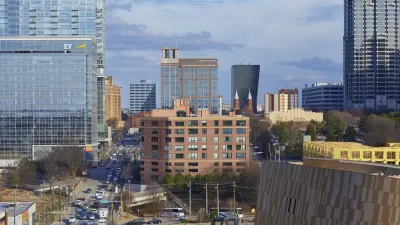A draft long-range Strategic Plan for Washington D.C.'s Metro aims to adapt one of the nation's busiest transit systems to the needs of a growing region, at a cost of $26 billion.
"Momentum" is the title of the ambitous strategic plan developed by Metro’s top managers over the past 18 months to guide one of the nation's busiest transit systems into a new era, reports Dana Hedgpeth. The reporter was given an advanced preview of the document (to the consternation of David Alpert at Greater Greater Washington), that was to be presented today to Metro’s board of directors.
The plan proposes a variety of investments over the next three decades, including building new rail tunnels and "other improvements to an aging system that is falling behind the region’s needs," and is seen as a "long-term threat to the region’s economic growth."
“If we don’t do something about what’s coming at us in terms of the region’s growth, we will have such a crowded system that it will create its own set of problems with regard to safety and infrastructure,” Richard Sarles, Metro’s general manager, said in an interview. “Now is the time for the region — with Metro in the lead — to begin talking about projects that make the most sense for making long-term investments.”
"Along with the proposed tunnels, Metro says it must spend billions of dollars to upgrade the rail system’s electrical grid to handle more eight-car trains and must add pedestrian corridors between transfer stations such as Metro Center and Gallery Place," notes Hedgpeth. "Above ground, Metro needs to buy more buses, build more bus garages and create bus-only lanes on busy downtown streets."
As with most plans of this magnitude, the question inevitably turns to who will pay for the recommended investments. For Metro, this question is even more critical because, unlike many other big-city transit systems, they lack a dedicated funding source. "Metro’s lack of capital investment in the past decade has been blamed on that lack of dedicated funding, and planners say that unless that changes, there is little hope of executing the ambitious strategic plan that will be formally unveiled Thursday," writes Hedgpeth.
"No such obvious source of financing exists for the new rail line and tunnels proposed in Metro’s new strategic plan, and the plan does not specify how the agency would finance the rail expansion and other costly improvements."
FULL STORY: Metro proposes major upgrade to D.C. transit

Planetizen Federal Action Tracker
A weekly monitor of how Trump’s orders and actions are impacting planners and planning in America.

Maui's Vacation Rental Debate Turns Ugly
Verbal attacks, misinformation campaigns and fistfights plague a high-stakes debate to convert thousands of vacation rentals into long-term housing.

Restaurant Patios Were a Pandemic Win — Why Were They so Hard to Keep?
Social distancing requirements and changes in travel patterns prompted cities to pilot new uses for street and sidewalk space. Then it got complicated.

In California Battle of Housing vs. Environment, Housing Just Won
A new state law significantly limits the power of CEQA, an environmental review law that served as a powerful tool for blocking new development.

Boulder Eliminates Parking Minimums Citywide
Officials estimate the cost of building a single underground parking space at up to $100,000.

Orange County, Florida Adopts Largest US “Sprawl Repair” Code
The ‘Orange Code’ seeks to rectify decades of sprawl-inducing, car-oriented development.
Urban Design for Planners 1: Software Tools
This six-course series explores essential urban design concepts using open source software and equips planners with the tools they need to participate fully in the urban design process.
Planning for Universal Design
Learn the tools for implementing Universal Design in planning regulations.
Heyer Gruel & Associates PA
JM Goldson LLC
Custer County Colorado
City of Camden Redevelopment Agency
City of Astoria
Transportation Research & Education Center (TREC) at Portland State University
Jefferson Parish Government
Camden Redevelopment Agency
City of Claremont





























